

New Mexico Legislature to Congress: Amend Against 'Citizens United' The Constitution of the United States can be amended in two formal ways: from the top down and from the bottom up. But New Mexico legislators have found a third way and, hopefully, other state legislators around the country will follow their lead. The US Constitution is traditionally amended via a process that begins with the endorsement of an amendment by the US House and US Senate and then the ratification of that amendment by the requisite three-fourths of state legislatures. That’s the top-down route. The bottom-up route begins when two-thirds of the state legislatures ask Congress to call a national convention to propose amendments.
But what if a state legislature tells Congress to get moving? That’s what happened over the weekend, when the New Mexico state Senate voted 20-9 to approve Senate Memorial 3, which calls on the Congress to pass and send to the states for ratification a constitutional amendment to overturn the US Supreme Court’s ruling in Citizens United v. United For the People. The Story of Citizens United v. FEC (2011) The Citizens United catastrophe. The strongest case against judicial activism — against “legislating from the bench,” as former President George W.
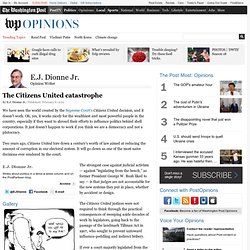
Bush liked to say — is that judges are not accountable for the new systems they put in place, whether by accident or design. The Citizens United justices were not required to think through the practical consequences of sweeping aside decades of work by legislators, going back to the passage of the landmark Tillman Act in 1907, who sought to prevent untoward influence-peddling and indirect bribery. If ever a court majority legislated from the bench (with Bush’s own appointees leading the way), it was the bunch that voted for Citizens United. Did a single justice in the majority even imagine a world of super PACs and phony corporations set up for the sole purpose of disguising a donor’s identity? Did they think that a presidential candidacy might be kept alive largely through the generosity of a Las Vegas gambling magnate with important financial interests in China?
CITIZENS UNITED Court Opinion. CITIZENS UNITED v .
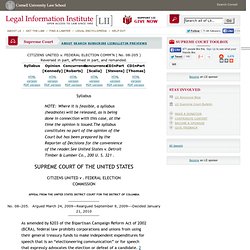
FEDERAL ELECTION COMMISSION appeal from the united states district court for the district of columbia No. 08–205. Argued March 24, 2009—Reargued September 9, 2009––Decided January 21, 2010 As amended by §203 of the Bipartisan Campaign Reform Act of 2002 (BCRA), federal law prohibits corporations and unions from using their general treasury funds to make independent expenditures for speech that is an “electioneering communication” or for speech that expressly advocates the election or defeat of a candidate. 2 U.
In January 2008, appellant Citizens United, a nonprofit corporation, released a documentary (hereinafter Hillary ) critical of then-Senator Hillary Clinton, a candidate for her party’s Presidential nomination. Citizens United v. Federal Election Commission. Citizens United v.
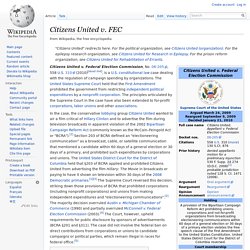
Federal Election Commission, No. 08-205, 558 U.S. 310 (2010)[dead link], is a U.S. constitutional law case dealing with the regulation of campaign spending by organizations. The United States Supreme Court held that the First Amendment prohibited the government from restricting independent political expenditures by a nonprofit corporation. The principles articulated by the Supreme Court in the case have also been extended to for-profit corporations, labor unions and other associations. Building a Democracy Movement - About Reclaim Democracy.org. Reclaim Democracy!
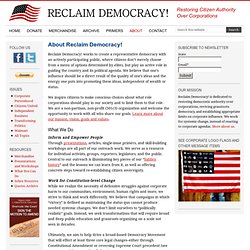
Works to create a representative democracy with an actively participating public, where citizens don’t merely choose from a menu of options determined by elites, but play an active role in guiding the country and its political agenda. We believe that one’s influence should be a direct result of the quality of one’s ideas and the energy one puts into promoting these ideas, independent of wealth or status. We inspire citizens to make conscious choices about what role corporations should play in our society and to limit them to that role. We are a non-partisan, non-profit (501c3) organization and welcome the opportunity to work with all who share our goals. Learn more about our mission, vision, goals and values. What We Do Inform and Empower People Through presentations, articles, single-issue primers, and skill-building workshops are all part of our outreach work. Taking Action Who We Are We also have numerous opportunities to get involved directly as a volunteer. Corporate personhood.
Corporate personhood is the legal notion that a corporation, separately from its associated human beings (like owners, managers, or employees), has at least some of the legal rights and responsibilities enjoyed by natural persons (physical humans).[1] In the United States and most countries, corporations have a right to enter into contracts with other parties and to sue or be sued in court in the same way as natural persons or unincorporated associations of persons.
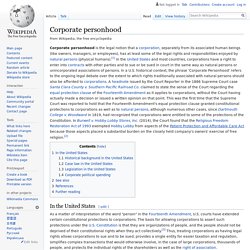
In a U.S. historical context, the phrase 'Corporate Personhood' refers to the ongoing legal debate over the extent to which rights traditionally associated with natural persons should also be afforded to corporations. A headnote issued by the Court Reporter in the 1886 Supreme Court case Santa Clara County v. STATE BY STATE CORP TAKE OVER.